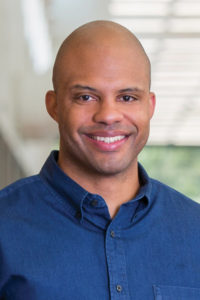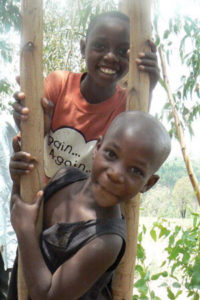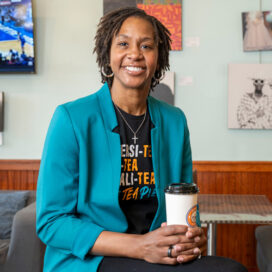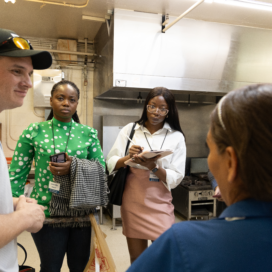Business on the Frontlines: Justin Whitmore
Published: February 26, 2019 / Author: John Nagy
Tyson Foods’ first chief sustainability officer reflects on what his experience in Rwanda taught him about empathy and finding common solutions
Tyson Foods is the largest food company in the United States and one of the largest meat-producing companies in the world. According to its website, the Arkansas-based firm that launched during the Great Depression as John Tyson’s chicken delivery business is now responsible for one of every five pounds of beef, chicken and pork that appear on restaurant plates and dining-room tables in the U.S. each day. If you’ve ever savored a Ball Park hot dog, a Jimmy Dean sausage patty or a Hillshire Farms smoked ham, you’re a Tyson customer.
 A few years ago, the company deepened its commitment to sustainability and created the position of chief sustainability officer. In 2017, Tyson hired Justin Whitmore (MBA ’11), then a McKinsey & Co. management consultant, to fill the position, which was later expanded to include corporate strategy and venture investments.
A few years ago, the company deepened its commitment to sustainability and created the position of chief sustainability officer. In 2017, Tyson hired Justin Whitmore (MBA ’11), then a McKinsey & Co. management consultant, to fill the position, which was later expanded to include corporate strategy and venture investments.
The stakes were high and the responsibilities vast. Whitmore had made a name for himself in the food industry as a leading mind on sustainability, corporate strategy and change management. Tyson tasked him to create a holistic and realistic approach toward rapid and across-the-board improvements in environmental compliance, food safety, quality assurance, worker health, animal welfare and corporate social responsibility.
For Whitmore, managing changes that go beyond image into the deeper substance of corporate practice means thinking about “the social, ecological and economic impact of everything we do,” and “how we create transparency into that for consumers” and the public.
When he considers where he learned how to do that, he recalls the farmers he met eight years ago in Rwanda through Professor Viva Bartkus’ path-breaking Business on the Frontlines course at Mendoza.
“Business on the Frontlines is uniquely positioned to develop leaders who think in sustainability terms,” he says, “where you absolutely create value for the shareholders, but you also are equally responsible for creating value for society as a whole.”
“Because there can be no more complex environment to think about how business can create social and economic impact than in war-torn countries.”
Before Whitmore and his classmates traveled to Rwanda in 2011, he says, they spent about six months researching the culture, history, politics and economic needs of the central African nation where ethnic and caste-based genocide had brutally ended the lives of as many as 1 million people 17 years earlier.
 Their job was to spend about two weeks on location, listening, listening, listening — to farmers, to government officials and to Catholic Relief Services personnel responsible for economic development programs — then building the trust necessary to get stakeholders to work together. One project was to create and support savings and lending communities through which these subsistence growers could pool their limited resources for things like starting a small business or buying livestock. Another project aimed to boost crop yields so the farmers could harvest enough to sell at a profit.
Their job was to spend about two weeks on location, listening, listening, listening — to farmers, to government officials and to Catholic Relief Services personnel responsible for economic development programs — then building the trust necessary to get stakeholders to work together. One project was to create and support savings and lending communities through which these subsistence growers could pool their limited resources for things like starting a small business or buying livestock. Another project aimed to boost crop yields so the farmers could harvest enough to sell at a profit.
Whitmore felt an affinity for the country. He recalls “lush landscapes, hills, green trees,” people ready for new ideas, a country “that had to rethink its workforce post-genocide” — and one which, Whitmore says, is “becoming a model for the world and how we think about women’s empowerment.”
Yet the excruciating collective memory of the genocide itself still “shrouds all things” in Rwanda, he says.
“I don’t think there’s a book that can prepare you for what my classmates and I saw at the memorials and churches we visited across the country. When you are confronted with the remains of children, your heart breaks for what this country has been through.
“From a learning perspective, it puts into context the importance of values-based leadership, and being empathetic to the “other,” to the person who is less fortunate, to the environment or context that we live in, and to make decisions, whether it be with policymakers, with business leaders or NGOs, that support an environment where things like this can never happen again.”
His experience in Rwanda puts his current challenge, the transformation of a 20th-century poultry distributorship into a 21st-century nutrition innovator — at a time of global population growth, resource limitations and sharpening consumer expectations — into perspective.
Tyson cites his strengths in “rallying diverse stakeholders around common solutions,” which he needs, because the firm, employing some 122,000 people in more than 100 facilities, with agricultural operations and partnerships spanning cropland around the world, has no lesser goal than “reshaping the global food system.”
Under Whitmore, and in close partnership with the World Resources Institute, Tyson is now making steady progress toward its goals of reducing companywide greenhouse gas emissions 30 percent by 2030, and water consumption by at least 12 percent from 2015 levels — by 2020.
In fact, on Jan. 15, 2019, Tyson announced a new partnership with the Environmental Defense Fund to develop and deploy initiatives that support Tyson’s sustainability strategy. Their first project will focus on land stewardship with a goal of scaling agricultural practices on 500,000 acres of corn that reduce greenhouse gas emissions, improve water quality and maximize farmer profitability.
For Whitmore, listening to stakeholders today means mostly American farmers and ranchers, but also “NGOs, policymakers and others in our industry to drive change throughout our supply chain,” as he said in a recent interview. “This is the only way to truly understand what we need to accomplish — and, more importantly, how we can do it together.”




